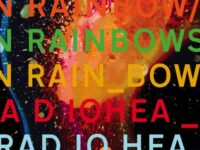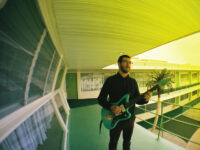Your cellphone was still too heavy and bulky and pointless to bother carrying out of the house. Grunge was blissfully unaware of its pending demise. Grim-eyed nerds were whispering about pornography that you can get on your dad’s computer. Life as everyone knew it was about to change, but no one was privy – everything was still too ’90s to notice.
Quentin Tarantino was the king of the world and Titanic was about to sink everyone and their aunt in snot and tears. Oasis still thought they were the Beatles, only cooler. Raves, with their auspiciously apt vowels, were the dangerous new in thing.
1997: It was the time of Brit-pop. But Radiohead had something quantum up their sleeves, and was about to give birth to its new self.
Several potent, unrelated elements were drawing into alignment to render the magnificent gloom and sprawl of Radiohead’s third album. Miles Davis’ Bitches Brew had something to whisper; Ennio Morricone was sitting on a shoulder, as was avant-garde classical composer Krzysztof Penderecki. Big Brother (the notion, not the yet-to-be-conceived TV show) had something to say; as did something still tentatively and awkwardly termed Intelligent Dance Music. Ditto millennial malaise and sinisterly burgeoning consumerism and general urban self-alienation. Oh and Kafka, of course. And decaying PCs.
By the time OK Computer arrived, Radiohead was transforming. Perfectly self-contained, the album nevertheless reads as a watershed between what the band was and would become: They were beginning to manifest their name (which earlier had no obvious connection to the music), with its connotations of internalized sonic frequencies – a human mind connected to transmissions, buzzing with sound. Man meets electron. No more Brit-Grunge here, boy.
Their sophomore release, The Bends, had revealed Thom Yorke’s sensitive ability to capture the loneliness of being human, and the fragile beauty of not-quite-connecting, finally hushing the critics who’d tagged them an Alternative One Hit Wonder, off the back of their British contribution to grunge, “Creep.”
But the band was itching for more, for something beyond the reach of the traditional band set-up. With OK Computer, they were beginning to tap into it. Not, according to band members, a concept album, it was nevertheless the first of their releases designed to be consumed whole – an approach that remained in place with subsequent releases.
Beginning with OK Computer, Radiohead was creating albums as sonic locations, unique haunting grounds with their own atmospheres and infrastructures. The LP was vaguely creepy, all up semi-human and lost somewhere between carbon-based and binary, its atmospherics an unlikely marriage between majestic romance and abject, post-modernity laced loneliness.
It was also, of course, their last guitar-driven album – and what a wallop! Jonny Greenwood seemingly attempted to
exorcise the very spirit of traditional guitar with his epically contorting and stuttering missives, prompting many to cite the album’s early centerpiece “Paranoid Android” as a new “Bohemian Rhapsody.” In truth, the song acts as a viable anti-“Bohemian Rhapsody,” a perverse twin mirroring the division of the composition into movements, but the glorious, soaring silliness of the latter replaced with utter, gorgeous desolation. Brilliance.
Sessions were initiated after a soul-depleting tour for The Bends that was forced upon them by their then-record company. EMI then decided to give them a deadline-free contract for what would become OK Computer. This freedom worked wonders, and ironically seemed to have amplified the band’s now well-documented disdain for and suspicion of record companies and the music industry at large.
Two of their later albums, of course, were initially offered free online, with fans asked to pay what they felt like. More than merely changing the musical landscape with OK Computer and its increasingly abstract-yet-lush offspring, Radiohead was now threatening the Industry itself, or at least making it sweat some.
What they channeled out there in the English countryside, where most of OK Computer was (ironically) recorded, no one knows, but from there on in they seemed to anticipate the future – musically, politically, technologically. Three years later, with the mind-bender Kid A, Radiohead simply became it.
[First published in Muse magazine.]
- How the Pixies Changed Everything With ‘Surfer Rosa’ - July 12, 2023
- Frank Zappa – ‘Funky Nothingness’ (2023) - June 30, 2023
- How Jim White’s ‘Wrong-Eyed Jesus!’ Changed My Mind About Country Music - June 14, 2023




